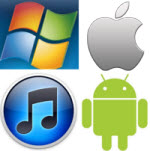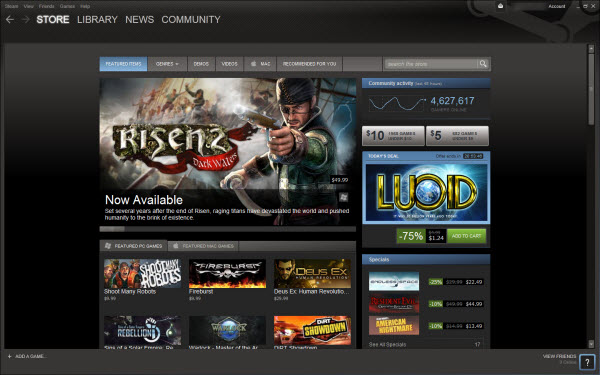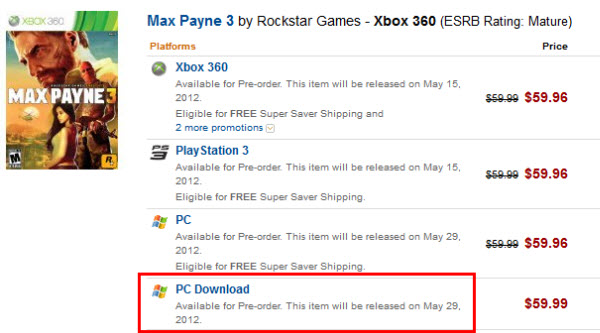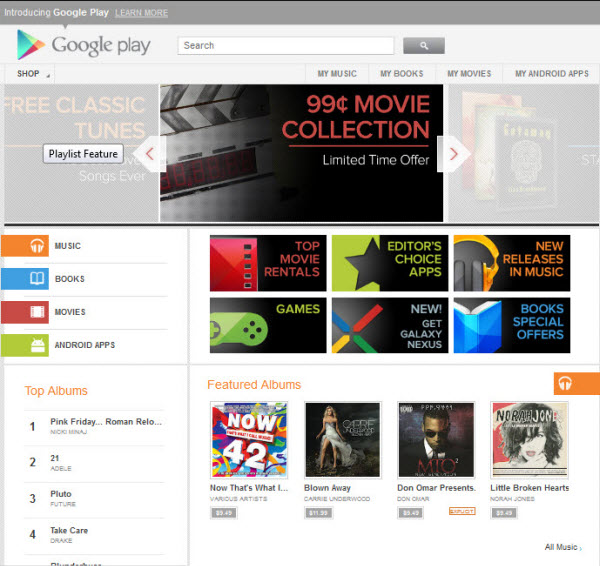 It wasn’t that long ago to get movies, games, and music; you had to drive to a store to buy it. Now almost everything can be bought online.
It wasn’t that long ago to get movies, games, and music; you had to drive to a store to buy it. Now almost everything can be bought online.
Receiving content, whether it be programs, videos, or other files, has become a digital process that is firmly embedded in almost everything we do.
Will we ever stop needing physical formats?
PC
We’re in a digital download era, pushed by the devices that we use. But as smaller developers and publishers have welcomed digital distribution as a primary way to get their programs out, the bigger publishers, specifically video game publishers, are still sitting on the fence. It looks like a waiting game for these companies.
Sony’s newest portable device, the PlayStation Vita, was marketed as a device that could download every title released. But with a lack of expansive backwards comparability for the older games already available for download, the system sits waiting for the next PS Vita game.
Overall, publishers are releasing games with the same ideas they have for the console market. Interesting enough, digital downloads remove the possibility of used-game sales; but they still charge the same price for a retail copy.

Whether it be through a service like Steam or from a developer’s website; it is much simpler to find software through the Internet than search at a retail store now. Even online retailers moved into digital downloads removing the necessity for physical storage of program boxes.
I think PC/Mac have been on the right track for a long time. Steam has forged digital downloads for games. The only disservice that I think publishers are forcing onto people who prefer this style of distribution is the cost of the product.

It shouldn’t cost the same for a program online as it does at a physical store, since publishers save by removing the production of physical cases and the quality assurance of working discs.
Cost is probably the biggest deterrent to widespread acceptance of digital downloads besides cultural or technological limitations. Honestly, if a program costs the same digitally as it does physically, I’ll buy the physical box just to have, because the convenience of downloading the program is very minimal in comparison.

Distribution doesn’t just apply to programs. Streaming content providers like Netflix or Amazon Instant Video changed how people view content. Add in the fact that most video will remain on these services for a good amount of time, and you don’t really have to deal with owning physical discs as well.
Netflix is my primary source for streaming media and it’s not difficult to imagine in the near future that most content will be streamed online through different hardware. Game consoles already support Netflix, and the introduction of Smart TVs is going to further segment that market.
Mobile
Beyond streaming video content or programs, just look at iTunes. You’re downloading digital audio content through a service without ever owning the physical media. iTunes is the service that has most changed how content could be sold, purchased, and accessed.

The service is a one-stop shop for all the content you could want. Publishers want to be a part of the service because of the huge population of users. The connection between the iPhone, iPod Touch, and iPad also creates an environment that allows paying customers to digest a variety of content. All Apple products connect through one service to embed those users.
The Google Play Store is like iTunes, but web based. It still offers a similar online store of content. I do think the web-based nature of Google Play is a little easier to use than the actual iTunes program, though the interaction between an Android device and Google Play can be annoying.

Games have grown incredibly beyond the PC/console world. Smartphones and tablets have evolved the mobile space. Looking at the original games available on iOS or Android, they were experiments on how to use the technology inside a multifunctional device.
Casual games exploded into this space. Angry Birds and Doodle Jump proved that games with quick sessions were best suited to the smaller screens. More recently, developers began creating more complex games. Graphics are improving and control schemes have become more intuitive to use the physical screen space.
At the same time, mobile created a generally consumer approved environment. Prices of mobile games vary, but there are set price points that publishers look at. The 99 cent app is an easily digestible cost. Depending on the operating system, you could be looking at a free-to-play game as well. The mobile space is also entirely digital. Everything is consumed through downloading.
Like PC, storage space isn’t a big concern because most utility apps don’t take up much space. Even the majority of games are relatively lightweight. While the restrictions of app size are implemented by the app stores, developers are finding a lot of tricks to get around it. The most common is for users to download an installer and then download files through Wi-Fi.

This method is a great solution for publishers, but it is a little misleading to users. More specifically on iOS, the limited storage space can make it difficult to download larger games. Infinity Blade II or Batman: Arkham City Lockdown are great examples of these limitations. Games are the biggest enemy for available storage space.
Backing up apps was also addressed early on. Local iTunes backups and iCloud alleviate this problem for iOS, and there are various utilities for Android to backup apps. It’s interesting because while I’m very concerned for my saved files on console or PC games, I’m rarely concerned about saving games on mobile.
The nature of most games on mobile doesn’t lead to many heavy penalties for players if they start from scratch (other than RPGs), and even when I lost a whole set of saved files on iOS, it didn’t bother me. The shelf-life for mobile games is much shorter than PC or console. My personal rate of digestion from download to completion is only a couple weeks.
 Even major publishers are accepting mobile as another source to attract users. The only drawback to performing these tasks is the screen size on the device and how the functionality has changed from keyboard/mouse to touchscreen.
Even major publishers are accepting mobile as another source to attract users. The only drawback to performing these tasks is the screen size on the device and how the functionality has changed from keyboard/mouse to touchscreen.
Apple’s market share of the iPad may be dominating the tablet market, but with Android and the eventual release of Windows 8, productivity could change. Tablets are moving away from being an extraneous piece of hardware to replacing laptops.
I don’t think tablets will be able to remove the necessity of laptops entirely, but they are good replacements for casual tasks.
The differing operating systems are going to eventually go head-to-head and it’s possible the unified nature of Windows 8 could push Android into the number three position.
Mobile may be leading the push of an almost entirely digital environment, but PC and Mac are the backbone of the digital distribution. It’s easy to say that mobile will revolutionize digital content, and I think it will be a great asset but I don’t think touch input and a tactile screen will be able to replace a mouse and keyboard.
When’s it coming?
Digital distribution is already here, but the utilization is very segmented towards specific devices and purposes. What may be holding it back is proven success on the business side, and for consumers it’s about how easy it is to use, as well as the cost. I think the casual common consumer doesn’t usually think beyond downloading an app and streaming Netflix at home while still buying movies and games at retail stores.
The system is more prevalent in both the PC and mobile space with only entertainment, movies and console gaming, really showing up as the last hold-out for the eventual dissolution of physical media. PC has already shown that optical drives are unnecessary and mobile remains a digital space. Depending on the quality of streaming media or the size of downloadable content, the eventual demise of physical media is on the horizon. It could take an upstart company that focuses only on digital to show how much success is available.

